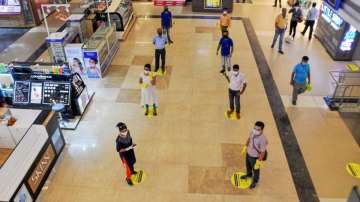Six feet distance may not be adequate to break Covid transmission chain
The rising cases of Covid in India and previously in the western countries triggered a debate that six feet distance could not be adequate to break the transmission chain of virus.

There have been talks about whether a six feet distance between a Covid-19 positive patient and a healthy person can prevent the transmission. Since the pandemic struck the world, experts have time and again suggested a series of guidelines and released protocols for a speedy recovery and breaking the chain. Maintaining a gap of six feet is among other measures that are being touted to be a key in the fight against the virus.
However, the rising cases of Covid in India and previously in the western countries triggered a debate that six feet distance could not be adequate. Several studies including the one published in Lancet, have suggested that the virus can be spread through the air. The virus can travel via very fine droplets and aerosolized particles from a Covid-19 positive person who is more than six feet away.
Dr Neeraj Jain, chairman, Dept. of Chest Medicine, Sir Ganga Ram Hospital, New Delhi, said that the second wave is more dangerous because of a highly infectious strain. It is transmitted very easily considering it is airborne.
“What makes it more worrying is the fact that, unlike the first wave, the second one is seeing the disease become more virulent after initial 4-5 days and, in the second week up to two-three weeks there is fever and infection which spreads to the lungs and does not respond to the usual treatment,” Jain said during a webinar on best practices and strategies for handling Covid-19.
Is Plasma Therapy Effective?
On the use of plasma therapy, he said that the role of plasma is doubtful, adding that it is usually required in patients whose immune system is overwhelmed and that too, only upon doctor’s advice.
Dr Rahul Gupta, senior physician, said that the disease is mild, but it can be controlled if people follow the Covid-19 protocol. "The moment you drop your guard, either you will be infected or re-infected,” he said. He emphasized that it is important to be self-disciplined and stay mentally strong and understand that the process of physical isolation is not emotional isolation.
Ashwajit Singh, MD, IPE Global, said that the need of the hour is to mask and mask because it not only protects self but others around.
On the reliability of RT-PCR, Singh said that it is a gold standard test with a sensitivity of nearly 70%. He added that there is a chance for it to be negative in case of improper sample collection. Transport and storage could be a few reasons for deviation.
"But it is necessary to immediately isolate yourself to protect self and others and repeat the test after 2-3 days," he suggested.
With nearly 2,400 government and private labs put together, India is today conducting about 20 lakh tests daily which combines both RT-PCR and Rapid Antigen tests.
India is struggling with a second wave of the pandemic with more than 3,00,000 daily new coronavirus cases being reported in the past few weeks. This has put huge pressure on the public health system, with hospitals in several states reeling under a shortage of medical oxygen, beds, medicines and equipment.
According to the Health Ministry data, the active cases stand at 37,04,893 as on Friday. The national recovery rate is 83.50 per cent. A total of 2,62,317 deaths have been reported so far in the country.
India's COVID-19 tally had crossed the 20-lakh mark on August 7, 30 lakh on August 23, 40 lakh on September 5 and 50 lakh on September 16. It went past 60 lakh on September 28, 70 lakh on October 11, crossed 80 lakh on October 29, 90 lakh on November 20 and surpassed the one-crore mark on December 19. India crossed the grim milestone of 2 crore on May 4.
READ MORE: Ayurveda-based Covid vaccine could soon become a reality
READ MORE: Polio vaccine maker BIBCOL to manufacture Covaxin at UP's Bulandshahr plant